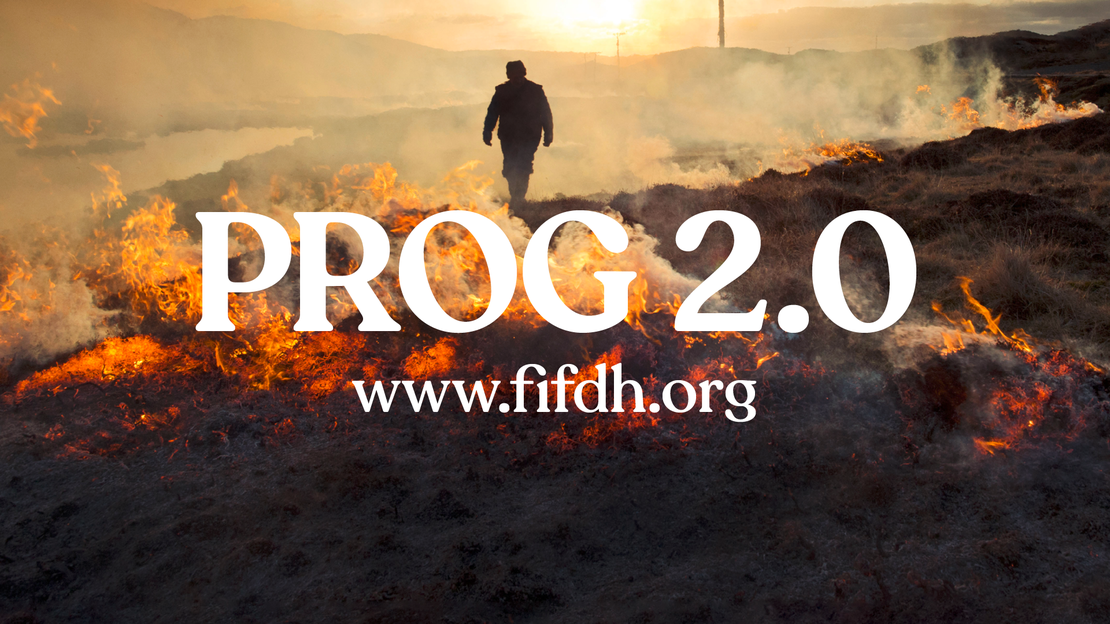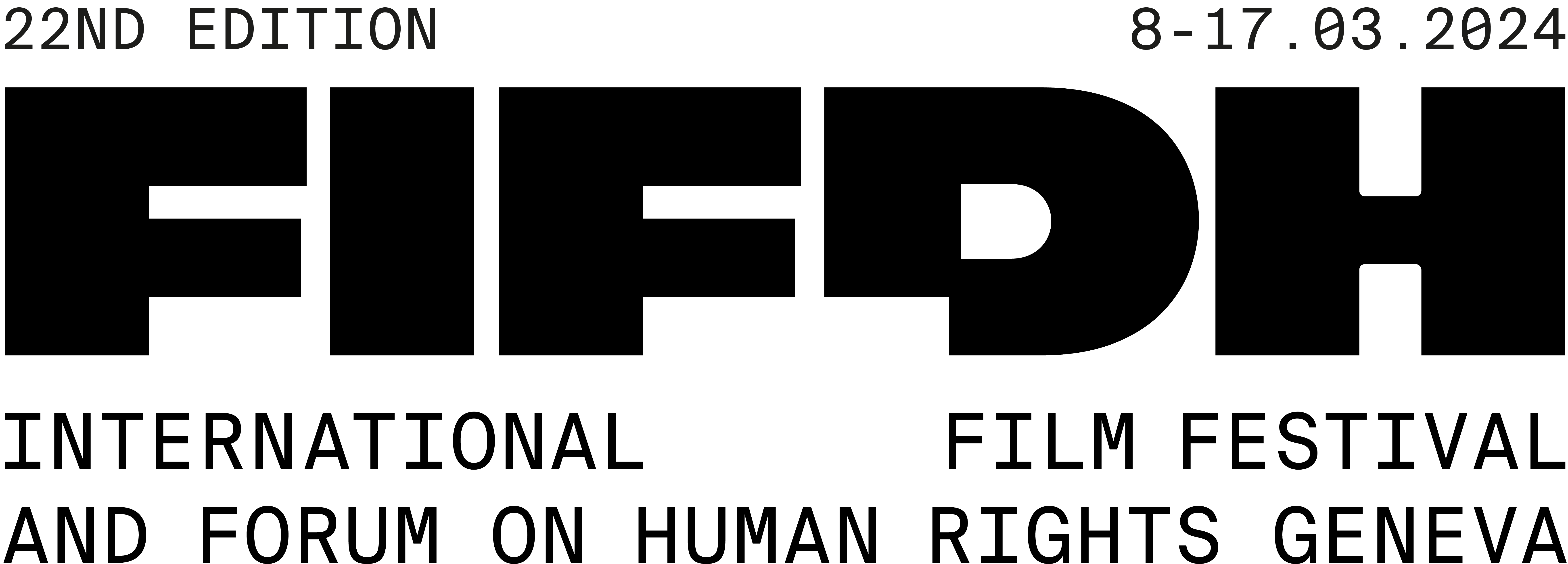Programme 2.0.
The FIFDH returns with an updated programme, after the cancellation of the public events of the 2020 edition. 27 debates and interviews will be transmitted live on the internet.

Friday 6 March
A Conversation with Burhan Sönmez
Co-presented with Gallimard and Payot
A Kurdish author who writes in Turkish and member of the International Jury of the FIFDH, Burhan Sönmez is the winner of numerous literary prizes, and his work has been translated into 30 languages. A lawyer specializing in human rights, he has long practiced in Istanbul. After a long exile, he now lives between Turkey and Cambridge. This meeting will be an opportunity to talk about his new novel, Labyrinthe, published by Gallimard, a powerful tale about memory and identity. Compared across the Atlantic to the work of Modiano and Camus, it has been received to great international critical acclaim.
Payot Rive Gauche, 12:15 pm.
China challenged : A Conversation with Kenneth Roth
In January 2020, Beijing banned Human Rights Watch's Executive Director Kenneth Roth from entering Hong Kong. He had come to present the organization's 2020 annual report, entitled "China's Global Threat to Human Rights". HRW believes that the Chinese government is engaged in the most intense offensive against the global human rights system in decades.
The Executive Director of Human Rights Watch Kenneth Roth will discuss the situation in Hong Kong in a major interview conducted by Serge Michel, Editorial Director of Heidi.news.
Replay:
Climate emergency, citizen's emergency: the possibility of a new world?
The climate emergency threatens the collapse of the world as we know it. In the face of this threat, is it possible to build a new form of society based on mutual aid, social justice and equality?
Debate with:
- Lisa Mazzone, State Councillor, Les Verts
- Pablo Servigne, Author and researcher
Moderated by Darius Rochebin, journalist, RTS
Livestream, 8:30 pm
Replay (in French):
Saturday 7 March
Profits over rights: the privatization of prisons
All over the world, sovereign actions such as detention are gradually being outsourced to private companies. What is left of detainees’ rights when a prison becomes an object of profit?
Debate with :
- Agnes Callamard, UN Special Rapporteur on extrajudicial, summary or arbitrary executions and Director of "Freedom of Expression", Columbia University
- Michael Flynn, Executive Director of the the Global Detention Project
- Ruth Hopkins, Investigative journalist
- Abdulaziz Muhamat, Refugees advocate and 2019 Martin Ennals Prize winner
- Femke Van Velzen, Co-filmmaker of Prison For Profit
Moderated by Luc Hermann, journalist and producer
Livestream, 2 pm
Replay:
Digital illiteracy: a violation of human rights
Digital transformation is profoundly changing our world and societies. Alongside its obvious benefits, is digital technology not also the source of new socio-economic inequalities?
Debate with:
- Isabelle Collet, Professor in Sciences of Education at the University of Geneva
- Rachid Zerrouki, Teacher in SEGPA (adapted general and professional teaching)
Moderated by Claire Balleys, Professor of sociology at the Geneva University of Social Work
Livestream, 5 pm
> Watch the film Without A Net: The Digital Divide in America in streaming (free)
Replay (in French):
Does international humanitarian law legitimise wars?
International Humanitarian Law (IHL) provides a platform for major humanitarian organisations to negotiate in the event of conflict. When a war is in conformity with the law, is it still legitimate?
Debate with:
- Rony Brauman, Doctor, ex-president of MSF, director of studies for CRASH - the center of reflexion on action and humanitarian knowledge at MSF
- Amani Ballour, Physician, protagonist of the film The Cave
- Annyssa Bellal, Strategic Counsellor in International Humanitarian Law, Geneva Academy
Moderated by Ghaith Abdulahad, Journalist, The Guardian
Livestream, 8 pm
Replay:
Sunday 8 March
Sudan: the women at the heart of the revolution
In Khartoum, over just a few months, street protests ousted Omar al-Bashir from power after more than 30 years of authoritarian and autocratic rule. What role did Sudanese women play in this revolution?
Debat with:
- Tahani Abass, Journalist and women’s rights activist
- Alaa Salah Ali Taha, Activist, symbol of the Sudanese Revolution
Moderated by Christophe Ayad, Special correspondent, Le Monde
Livestream, 2 pm
> Watch the film Soudan: les femmes en première ligne in streaming, with ARTE
Replay:
Menstrual health: Periods without taboos?
Even today, menstruation remains taboo and access to sanitary protection is a privilege not afforded to vulnerable people and minority groups. But why do we afford so little consideration to menstruation?
Debate with:
- Lauren Anders Brown, Director of WOMENstruate
- Ayanda Dlamini, Protagonist of WOMENstruate
Moderated by Anne-Claire Adet, Co-director of the festival Les Créatives
Livestream, 7 pm
Replay:
Monday 9 March
A Conversation with Joe Sacco
"International reference of the 9th art", "pioneer", "one of the world's finest illustrators" : praise rains down on Joe Sacco. The author mixes the languages of comics and journalism like no one else, and the power of his work is also due to the personal stories that he knows how to capture like no other, interweaving past and present. His new book Paying the Land is about the Dene people of Canada in a region decimated by shale gas exploitation.
Livestream, 6 pm
Replay:
End of the world: shelter for the Swiss?
Switzerland was ready for a nuclear war, which did not come. The climate threat however is very real. And this time, the army and activists are uniting to fight it.
Debate with:
- Niels Ackermann, Photojournalist
- Grégoire Chambaz, Associate Editor, Swiss Military Review
- Solal Gilbert, Climate Activist for earth and life
- Mathieu Glayre, Co-founder of the political ecology journal Moins! ("Less!")
- Ghalia Kadiri, Reporter
Moderated by Serge Michel, Editorial Director of Heidi.news
Livestream, 8:30 pm
Replay (in French):
Tuesday 10 March
From local revolts to global protest? A Middle-Eastern perspective.
Confronted with troubled political regimes and drastic increases in inequality, people in many countries are taking to the streets to demand change. What links can be drawn between these uprisings?
Debate with:
- Alaa Salah, Activist, symbol of the Sudanese Revolution
- Perla Joe Maalouly, Filmmaker / Artist / Activist
- Ghaith Abdulahad, Journalist, The Guardian
Moderated by Christophe Ayad, Special correspondant, Le Monde
Off-line broadcasting, 7:30 pm
Replay:
When the messenger is being shot: attacks on journalists
Access to free and independent information is essential to the life of any democracy. What to do when those who are supposed to produce it find themselves threatened, prevented from doing their work and attacked?
Debate with:
- Hatice Cengiz, Justice for Jamal
- Agnès Callamard, UN Special Rapporteur on extrajudicial, summary or arbitrary executions and Director of "Freedom of Expression", Columbia University
- Emin Huseynov, Azerbaijani journalist, political refugee in Switzerland
Moderated by Josephine Schmidt, Executive Editor, The New Humanitarian
Off-line broadcasting,9 pm
Replay:
Wednesday 11 March
The appropriation of victims' voices : a conversation with Abdulaziz Muhamat
The use of celebrities to raise the visibility and media profile of a humanitarian crisis has become common practice among major international organizations. By engaging the services of the rich and famous, the United Nations aims to give exposure, a face and a voice to causes that otherwise escape the political agenda and international public debate. But what authority do stars have to address the Security Council after only being on the ground for a photo op? Can we accept this appropriation of the voice of the victims, who live through humanitarian crises and wars on a daily basis? If it is easy to listen to someone who speaks out on behalf of victims who have been silenced, it is also time to question this invisibility.
Abdulaziz Muhammat, Prix Martin Ennals 2019, who was held for five years in the Manus Island detention centre off the coast of Australia while he was a refugee, will discuss these mechanisms with Catherine-Lune Grayson, adviser in the ICRC's policy and humanitarian diplomacy division.
Livestream, 8:30 pm
Replay:
Thursday 12 March
Youth for climate: a generation standing alone on the front line?
Young people have been taking to the streets for the past 2 years, exposing political inaction towards the climate emergency. How and why has this citizens' revolt succeeded in influencing the global political agenda?
Debate with:
- Océane Dayer, Founder of Swiss Youth for Climate
- Bernard Burnand, Public health physician committed to the climate, member of Grandparents for the climate
- Anuna de Wever, Belgian Flemish climate activist, creator of the Belgian Youth for Climate movement, protagonist in Youth for Climate
Moderated by Caroline Dommen, freelance journalist and researcher
Livestream, 7:30 pm
Replay (in French):
Friday 13 March
Geopolitics of the environment: a conversation with François Gemenne
We are facing a multifaceted disaster: ecological, political, social and economic. Many researchers agree that humans have had such an impact on the Earth's ecosystem that it justifies the creation of a new geological era: the Anthropocene. This threatens their very survival as an animal species.
François Gemenne, researcher, specialist in the geopolitics of the environment and author of Atlas de l'Anthropocène, will propose courses of action to fight environmental degradation in an interview with Sébastien Malo, Journalist at Reuters.
Livestream, 7:45 pm
Replay (in French):
Coronavirus and Human Rights
The coronavirus epidemic reveals the weaknesses of national health systems, but also the gaps in global health surveillance mechanisms. It challenges the social cohesion of our societies, as the panic awakes openly racist and discriminatory behaviour. Finally, authoritarian responses by health and political authorities are amplifying pre-existing economic, political and social difficulties. How can the rights of patients, their families and the population as a whole be protected?
Debate with:
- Didier Pittet, Swiss Infectious Disease Physician and Epidemiologist
- Francesco Panese, Associate professor of social studies of science and medicine at the University of Lausanne
Moderated by Annick Chevillot, Head of the Health section, Heidi.news
Livestream, 9 pm
Replay (in French):
Saturday 14 March
In Palestine, injustice is also environmental
Adapting to climate change in Palestine is more of a political issue than a purely environmental one. How can we ensure the survival of a people that are both Stateless and deprived of their natural resources?
Interview with Michael Mason, Director of the Middle East Centre, The London School of Economics and Political Science, moderated by Alaa Tartir, Research Associate, Centre on Conflict, Development and Peace-building, IHEID
Livestream, 2:30 pm
Replay:
Economy and climate: two irreconcilable realities?
The main indicator of economic policy for decades, GDP growth is now a much-decried concept. How can economic development be made compatible with respect for the environment?
Debate with:
- Dorothée Baumann-Pauly, Director of the Geneva Center for Business and Human Rights, UNIGE
- Thomas Vellacott, CEO of WWF Switzerland
- Fabio Sofia, President of Sustainable Finance Geneva
Moderated by Frédéric Lelièvre, Deputy Editor-in-Chief, CNNMoney Switzerland
Livestream, 6:30 pm
